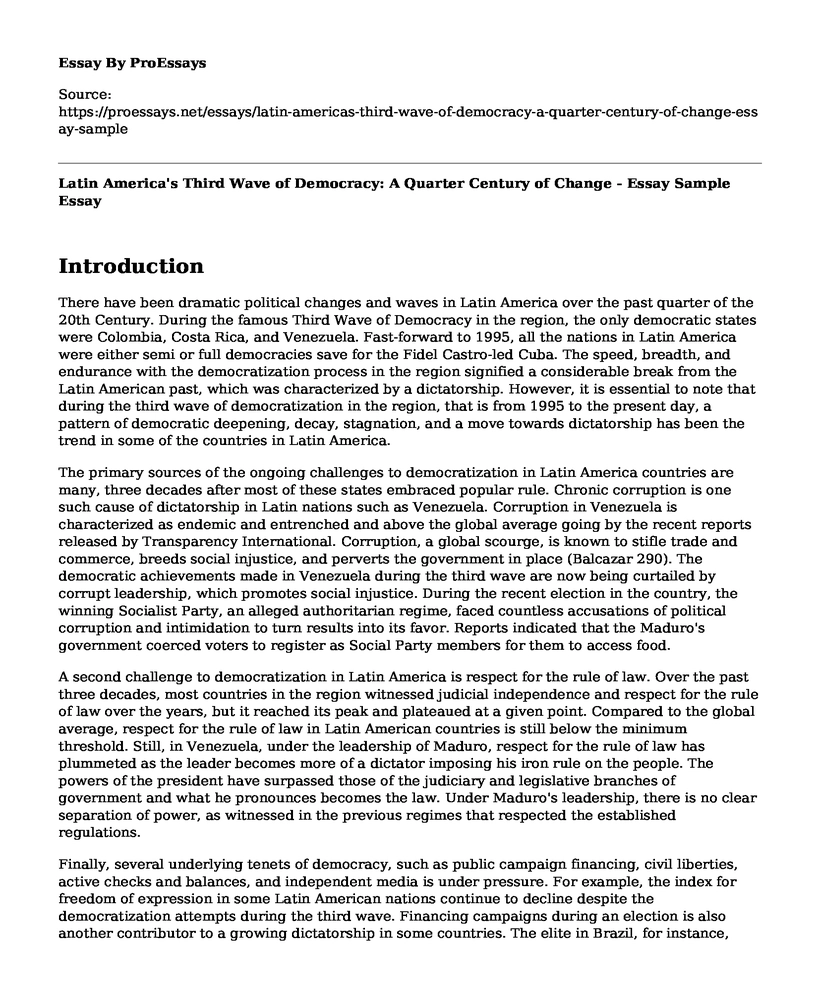Introduction
There have been dramatic political changes and waves in Latin America over the past quarter of the 20th Century. During the famous Third Wave of Democracy in the region, the only democratic states were Colombia, Costa Rica, and Venezuela. Fast-forward to 1995, all the nations in Latin America were either semi or full democracies save for the Fidel Castro-led Cuba. The speed, breadth, and endurance with the democratization process in the region signified a considerable break from the Latin American past, which was characterized by a dictatorship. However, it is essential to note that during the third wave of democratization in the region, that is from 1995 to the present day, a pattern of democratic deepening, decay, stagnation, and a move towards dictatorship has been the trend in some of the countries in Latin America.
The primary sources of the ongoing challenges to democratization in Latin America countries are many, three decades after most of these states embraced popular rule. Chronic corruption is one such cause of dictatorship in Latin nations such as Venezuela. Corruption in Venezuela is characterized as endemic and entrenched and above the global average going by the recent reports released by Transparency International. Corruption, a global scourge, is known to stifle trade and commerce, breeds social injustice, and perverts the government in place (Balcazar 290). The democratic achievements made in Venezuela during the third wave are now being curtailed by corrupt leadership, which promotes social injustice. During the recent election in the country, the winning Socialist Party, an alleged authoritarian regime, faced countless accusations of political corruption and intimidation to turn results into its favor. Reports indicated that the Maduro's government coerced voters to register as Social Party members for them to access food.
A second challenge to democratization in Latin America is respect for the rule of law. Over the past three decades, most countries in the region witnessed judicial independence and respect for the rule of law over the years, but it reached its peak and plateaued at a given point. Compared to the global average, respect for the rule of law in Latin American countries is still below the minimum threshold. Still, in Venezuela, under the leadership of Maduro, respect for the rule of law has plummeted as the leader becomes more of a dictator imposing his iron rule on the people. The powers of the president have surpassed those of the judiciary and legislative branches of government and what he pronounces becomes the law. Under Maduro's leadership, there is no clear separation of power, as witnessed in the previous regimes that respected the established regulations.
Finally, several underlying tenets of democracy, such as public campaign financing, civil liberties, active checks and balances, and independent media is under pressure. For example, the index for freedom of expression in some Latin American nations continue to decline despite the democratization attempts during the third wave. Financing campaigns during an election is also another contributor to a growing dictatorship in some countries. The elite in Brazil, for instance, have mastered the need for financing presidential, patronage politics, and media owners to influence the outcome of any presidential election.
Conclusion
In sum, attempts to democratize Latin America faced emerging challenges as some of these nations plummet so first towards dictatorship. As evident in the highlighted examples, most states have some Latin American nations have moved from rule by the popular vote to influencing the outcome by the countries' elites.
Works Cited
Balcazar, Carlos Felipe. "Long-run effects of democracy on income inequality in Latin America." The Journal of Economic Inequality 14.3 (2016): 289-307.
Cite this page
Latin America's Third Wave of Democracy: A Quarter Century of Change - Essay Sample. (2023, Mar 24). Retrieved from https://proessays.net/essays/latin-americas-third-wave-of-democracy-a-quarter-century-of-change-essay-sample
If you are the original author of this essay and no longer wish to have it published on the ProEssays website, please click below to request its removal:
- Essay on Dangers in Police Realized As They Die In Line of Duty
- Voting as a Duty of Citizenship Essay
- Minority Influence and Social Change Essay Example
- Questions and Answers Essay on Government Intervention in the Economy
- Essay on Nurse Practitioners: Impact of Regulatory Policies on Advanced Practice Nursing
- Paper Example on U.S. Political Parties: The Trump Era and Its Impact on Business
- Essay Sample on Public Administration: Coordinating Government Activities







